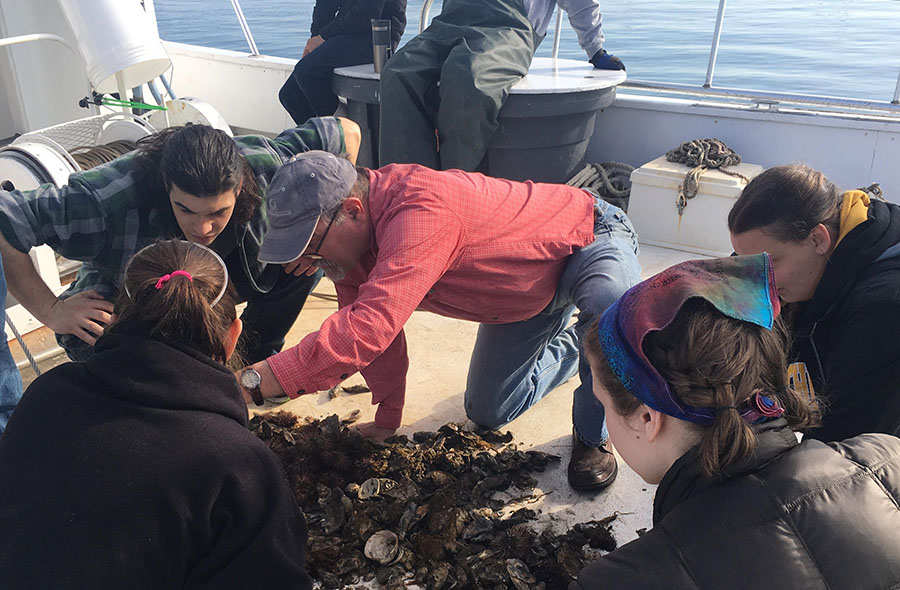
Dr. Steve Hageman, center, on the deck of the University of North Carolina Institute of Marine Science’s research vessel with his paleontology students from Appalachian State University in the spring of 2018. Hageman and the team examined invertebrate organisms dredged from the seafloor near Atlantic Beach and Morehead City. Photo submitted
BOONE, N.C. — Dr. Steve Hageman, professor of geology in the Department of Geological and Environmental Sciences, which is housed in Appalachian State University's College of Arts and Sciences, has been awarded a 2018–19 Fulbright Scholar Program award to study the effects of global warming on marine polar Arctic organisms through the Institute of Oceanology of the Polish Academy of Sciences.
“I am honored and grateful to be the recipient of a Fulbright Fellowship this year. Many people do not realize that the Fulbright program is organized, administered and funded by the U.S. State Department,” he said. “Fulbright’s primary mission is diplomacy, which happens naturally when people have the opportunity to get together to work toward solving a shared problem.”
Hageman also received a Fulbright award in 2006–07, which allowed him to work in marine and genetics labs in Croatia to learn new research methods in evolutionary biology and paleobiology.
He came to Appalachian in 1998 from the Field Museum in Chicago, Illinois, where he was a research associate. He holds a bachelor’s in geology from the University of Kansas. His master’s and doctorate, both in geology, are from the University of Illinois.
According to Hageman, the effects of human-induced global climate change as a result of greenhouse gas emissions are now evident in most places on the planet. The polar Arctic — both land and sea — exhibits the most significant temperature increase as a result of this change, he said.
Scientists have long recognized Bergmann’s Rule, which states as average temperature increases, the body size of organisms decreases, Hageman said, although scientists don’t fully understand the causes of this relationship.
Over the past 10 years, a team of Polish and Norwegian scientists with the National Academy of Sciences have collected and measured the size and shape of marine organism shells from the Arctic polar region.
Using this data, Hageman, a paleontologist, will bring the statistical methods he uses to distinguish between evolutionary and environmental changes in the size of fossil skeletons to inform the study of polar Arctic organisms.
He said the broader goal of the study is to document how the body size of Arctic marine organisms is changing in response to climate change that has already occurred and to determine if these relationships can be used as a proxy in future studies.
“By accounting for these complex relationships, researchers will then be able to more directly highlight the influence of temperature change on body size,” he said. “This may allow for the development of even more targeted questions about future impacts of human-induced climate change.”
For information about how to apply for faculty and staff Fulbright awards, as well as more information regarding international scholarship assistance, visit the university’s Office of International Education and Development (OIED).
About the Office of International Programs
Appalachian State University combines a strong liberal arts foundation with a comprehensive, pervasive and integrated commitment to global engagement. The Office of International Programs assists App State in fulfilling its global engagement mission by working to develop awareness, knowledge, appreciation and respect of cultural differences — in both domestic and international contexts — in the university’s students, faculty and staff, as well as in the surrounding communities. Learn more at https://international.appstate.edu.
About the Department of Geological and Environmental Sciences
Located in Western North Carolina, Appalachian State University provides the perfect setting to study geological and environmental sciences. The Department of Geological and Environmental Sciences provides students with a solid foundation on which to prepare for graduate school or build successful careers as scientists, consultants and secondary education teachers. The department offers six degree options in geology and two degree options in environmental science. Learn more at https://earth.appstate.edu.
About the College of Arts and Sciences
The College of Arts and Sciences (CAS) at Appalachian State University is home to 17 academic departments, two centers and one residential college. These units span the humanities and the social, mathematical and natural sciences. CAS aims to develop a distinctive identity built upon our university's strengths, traditions and locations. The college’s values lie not only in service to the university and local community, but through inspiring, training, educating and sustaining the development of its students as global citizens. More than 6,800 student majors are enrolled in the college. As the college is also largely responsible for implementing App State’s general education curriculum, it is heavily involved in the education of all students at the university, including those pursuing majors in other colleges. Learn more at https://cas.appstate.edu.
About Appalachian State University
As a premier public institution, Appalachian State University prepares students to lead purposeful lives. App State is one of 17 campuses in the University of North Carolina System, with a national reputation for innovative teaching and opening access to a high-quality, cost-effective education. The university enrolls more than 21,000 students, has a low student-to-faculty ratio and offers more than 150 undergraduate and 80 graduate majors at its Boone and Hickory campuses and through App State Online. Learn more at https://www.appstate.edu.
What do you think?
Share your feedback on this story.







![How NCInnovation Is Rethinking Economic Development in North Carolina [faculty featured]](/_images/_posts/2026/02/rethinking-economic-development-600x400.jpg)






